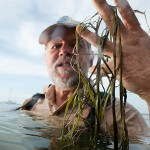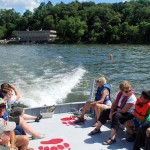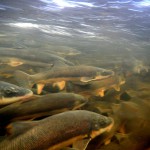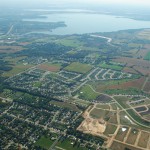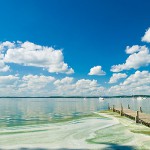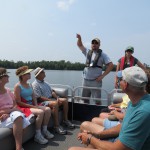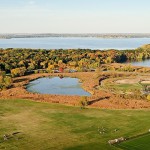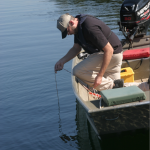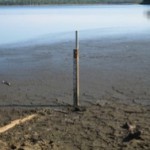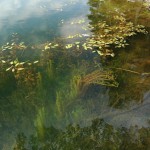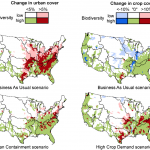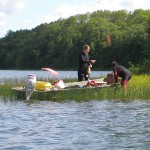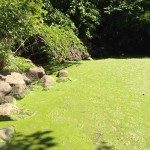Tag Limnology
Embrace the chaos: Predictable ecosystems may be more fragile
A new study published in the Proceedings of the National Academy of Sciences says managing our environment for predictable outcomes is risky. In fact, more often than not, it backfires.
Changes in land use, climate and agriculture undermine efforts to clean up Madison lakes
Efforts to clean up the Madison lakes are being hampered by more asphalt, row crops and intense rainstorms and higher manure concentrations on the landscape, according to a new study from the Water Sustainability and Climate project at the University of Wisconsin–Madison.
Humanity has exceeded 4 of 9 ‘planetary boundaries,’ according to researchers
An international team of researchers says climate change, the loss of biosphere integrity, land-system change, and altered biogeochemical cycles like phosphorus and nitrogen runoff have all passed beyond levels that put humanity in a “safe operating space.” Civilization has crossed four of nine so-called planetary boundaries as the result of human activity, according to a report published today in Science by the 18-member research team. Among them is Steve Carpenter, director of the University of Wisconsin–Madison Center for Limnology and the only U.S.-based researcher on the study.
Possible futures for the Yahara Watershed to be unveiled at public event
The Yahara Watershed is a unique and vibrant part of south-central Wisconsin. It is home to the state capital, 370,000 people, 170,000 acres of productive farmland, and four beloved lakes - Mendota, Monona, Waubesa and Kegonsa.
Citizen scientists provide clarity for lake researchers’ big questions
A massive new study of water clarity trends in Midwestern lakes is sure to make some waves in scientific circles. The study involved nearly a quarter of a million observations in 3,251 lakes spread across eight states, and data dating back seven decades. But it’s where that data came from that’s truly noteworthy. For the report, published online April 30 in the journal PLOS ONE, researchers turned exclusively to citizen scientists.
‘Cabinet of curiosities’ captures nature through work of artists and scientists
Of all the places Sierra Swenson expected to end up during her first semester at college, precious few were lined with jars full of preserved reptiles.
Scientists ID 10-year water-level cycle in Great Lakes basin; say current lows buck trend
For at least the last 70 years, lakes and aquifers in northern Wisconsin have followed the same pattern - after higher than average peaks, water levels spend about 10 years on a downward trend before abruptly spiking up again, only to repeat the decade-long fall back to low-water conditions.
Study challenges prevailing view of invasive species
Zebra mussels. Asian carp. Kudzu. Chances are you recognize these names as belonging to invasive species - plants or animals that are relocated from their native habitat to a foreign land, only to prove so prolific that they take over their new home. Except that's not how the story usually goes, according to a new study.
Study puts freshwater biodiversity on the map
When it comes to economic growth and environmental impacts, it can seem like Newton's third law of motion is the rule - for every action, there is an equal and opposite reaction - and that in most cases, the economy prospers and the environment suffers.
Scientists find early warning indicators of major ecological change
Day after day, the buoy bobbed at the surface of Peter Lake. Every five minutes, or 288 times a day, instruments in the water silently recorded samples without creating so much as a ripple. But, beneath the surface, the lake - just across Wisconsin's northern boundary in Michigan's Upper Peninsula - was in turmoil. The buoy was busy documenting massive change.
In whole-lake experiment, have invasive crayfish met their match?
Four years ago, University of Wisconsin–Madison researchers wrapped up a multi-year effort to dramatically reduce the population of a destructive invasive species in a northern Wisconsin lake.
Storm water treatment will strip phosphorus from Arboretum pond
The UW Arboretum’s Marion Dunn Pond will soon be home to a pilot project aimed at snatching the phosphorus and sediment from storm water before it surges into the wetlands around Lake Wingra.
First, fishing. Then, volleyball. Serious fun at Trout Lake Station
Angling for perch at sundown is just one of the perks of Wes Matthews’ summer research job at Trout Lake Station in Wisconsin’s north woods. Another is donning scuba gear and diving for lost equipment. The most important task, though, wouldn’t appeal to everyone. “Basically, I study what fish had for lunch,” says Matthews.
Study suggests some fishing regs aren’t in line with fishing reality
A new study by University of Wisconsin–Madison Center for Limnology researchers says that when it comes to managing sport fisheries, regulations aren't in line with the reality of some fishing trips.
Road block: Fixing aquatic ecosystem connectivity doesn’t end with dams
Over the last several years, state agencies and environmental nonprofit organizations have targeted dam removal as a way to quickly improve the health of aquatic ecosystems. Dams keep migratory fish from swimming upriver to spawn, block nutrients from flowing downstream, and change the entire hydrology of a watershed. From an ecosystem perspective, taking down a dam and returning a river to a more natural flow seems like a no-brainer.
‘Audio field trip’ to celebrate campus wetland and remember campus zoologist
An "audio field trip" on Memorial Day will explore a restored marsh on the University of Wisconsin–Madison campus - a part of the university's Lakeshore Nature Preserve. The marsh, near the western end of campus, is a remnant of a much larger wetland that was drained for other uses such as growing corn.

